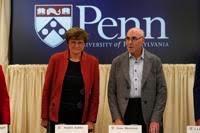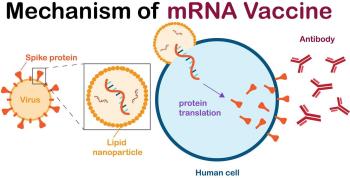 Katalin Kariko, a native of Hungary, and Drew Weissman of the University of Pennsylvania were awarded the 2023 Nobel Prize for Medicine or Physiology. The award recognizes their pivotal contribution to mRNA technology that ultimately made possible the vaccine against COVID-19. The initial work was conducted in 1997 by Kariko and Weissman at the University of Pennsylvania. They were able to modify mRNA by substitution of methylpseudouridine for uridine, a component of the RNA molecule. This compound was responsible for a cytokine response resulting in inflammation without inducing immunity. The modification made possible a candidate vaccine subjected to subsequent studies by Kariko and Weissman. They eventually established a research enterprise RNARx to attempt commercialization of the mRNA principle.
Katalin Kariko, a native of Hungary, and Drew Weissman of the University of Pennsylvania were awarded the 2023 Nobel Prize for Medicine or Physiology. The award recognizes their pivotal contribution to mRNA technology that ultimately made possible the vaccine against COVID-19. The initial work was conducted in 1997 by Kariko and Weissman at the University of Pennsylvania. They were able to modify mRNA by substitution of methylpseudouridine for uridine, a component of the RNA molecule. This compound was responsible for a cytokine response resulting in inflammation without inducing immunity. The modification made possible a candidate vaccine subjected to subsequent studies by Kariko and Weissman. They eventually established a research enterprise RNARx to attempt commercialization of the mRNA principle.
Kariko joined BioNTech in Germany during 2013 and demonstrated that encasing mRNA in a lipid fragment would allow the mRNA to enter cells and initiate the synthesis of proteins stimulating an immune response. It was fortuitous that studies on mRNA technology based on the work conducted during the late 1990s and subsequently refined could be rapidly adapted to develop an effective COVID vaccine when the urgent need arose.

A spokesperson for the Nobel Assembly at the Karolinska Institute in Stockholm, commented, “There is no need to emphasize that the basic discovery made by the Laureates has made a huge impact on society.” As of the first quarter of 2023, more than 13 billion COVID-19 vaccine doses have been administered, and collectively the various mRNA vaccines have probably saved 20 million lives globally. In the U.S. alone, it is estimated that ten million hospitalizations and one million deaths were prevented as a result of the mRNA vaccines produced by Moderna and Pfizer/BioNTech.
Weissman supported Kariko as far as was possible during the late 1990s although skepticism among the scientific community deprived her of funding. Lack of recognition and support in the U.S. led to her return to Europe to join BioNTech. Dr. Kariko is the 61st woman to win a Nobel Prize since 1900 and is the 13th recipient in the category of Physiology and Medicine.
The Nobel award for the development of mRNA vaccine technology performed nearly 30 years ago is a validation of this novel approach to vaccines. The prize belies the contention that the COVID vaccine developed and tested during Operation Warp Speed was developed too rapidly and involved novel concepts that were inadequately researched.